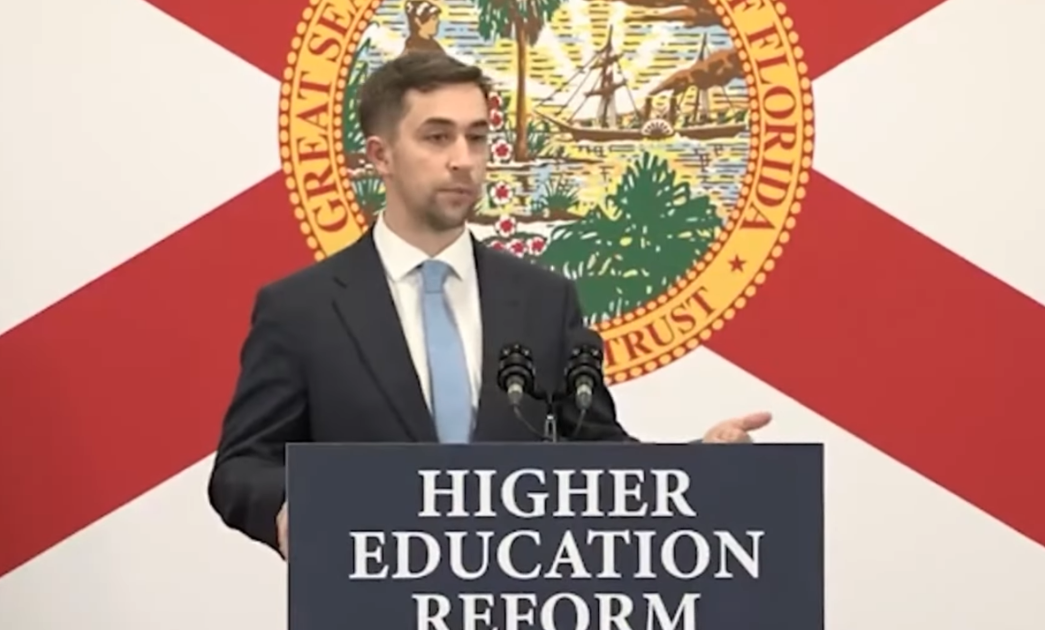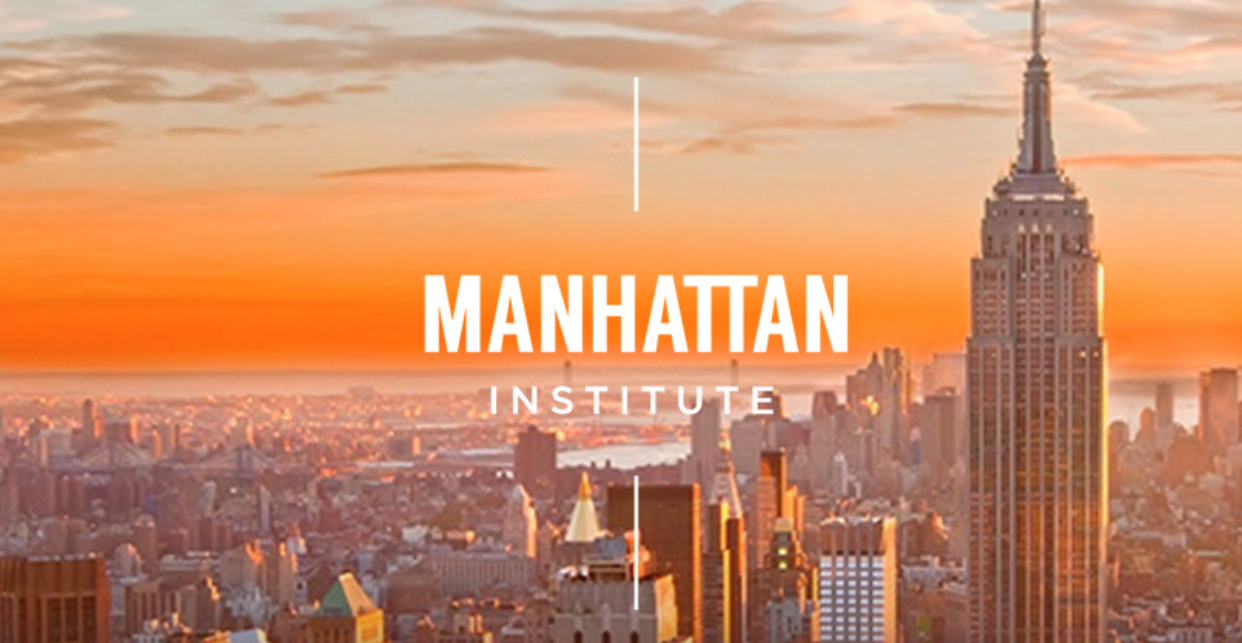Following their appointments, something the New College community quickly recognized about the seven new Board of Trustee (BOT) members was that not all of them had prior experience working in educational institutions, and many were coming from out of state. Even without the work credentials or in-state experience, however, it is clear that these new members bring powerful and wealthy connections with them. One example is Trustee Christopher Rufo, who is also a Senior Fellow at the Manhattan Institute. Reflections of the Manhattan Institute’s priorities have already begun to reach New College. For instance, the “Abolish DEI Bureaucracies” proposal that Rufo presented at the Jan. 31 BOT meeting was co-authored by another Manhattan Institute Senior Fellow, Ilya Shapiro. With this in mind, the Catalyst presents a profile of the Manhattan Institute: its history, priorities and educational initiatives.
A Brief History
The Manhattan Institute for Policy Research is a conservative think-tank originally established in 1977 by libertarian Anthony Fisher and former Central Intelligence Agency (CIA) Director William J. Casey. The institute was originally called the International Center for Economic Policy Studies, and while “economic choice” remains a cornerstone of its mission, the group also brands itself as “an important force in shaping American political culture” with a focus on policy research topics such as welfare reform and the “anti-work ‘welfare rights’ agenda,” the role of unions, income inequality and much more.
In its early years during the Reagan administration, the institute supported the publication of books such as George Gilder’s Wealth and Poverty (1981), which questions the character of the poor, stating that “the current poor, white even more than black, are refusing to work hard.” The institute also backed Losing Ground (1984) by Charles Murray, which argues that welfare reform harms poor and minority citizens by not incentivizing them to work.
Murray left the Manhattan Institute for the American Enterprise Institute in 1989; it has been widely reported that the Manhattan Institute asked him to go because his proposed work on race-based intelligence was a bridge too far. In 1994 he co-authored The Bell Curve, among the most controversial books of its era. However, according to a forum of past events that the Manhattan Institute has organized, Murray has worked with the institute as recently as 2007 for a symposium titled “The Black-White IQ Gap: Understanding the Data and Its Policy Implications.”
In 1989, the Manhattan Institute founded the Center for Education Innovation (CEI) in New York, which focuses on supporting charter schools in the state.
In 1990, the Manhattan Institute created its own magazine, the City Journal, formed in response to “New York’s downward spiral and to the illness of the American city.” Today, the City Journal website includes a page dedicated to the ongoing investigative series, “Christopher Rufo on Woke Education,” and featuring headlines such as “How Gender Radicalism Conquered Sacramento Schools,” “In Portland, the Sexual Revolution Starts in Kindergarten” and “Critical Race Fragility.”
Rufo and City Journal Editor Brian C. Anderson are both scheduled to appear in April at a California event entitled “City Journal in California: Resisting Californification.” The institute website advertised the event as “a panel discussion moderated by City Journal editor Brian Anderson and featuring two authors from City Journal’s new special issue, ‘Can California Be Golden Again?’ Christopher Rufo will talk about the state’s identitarian agenda in public institutions, including a new ethnic-studies curriculum whose excesses he’s chronicled at length, and how to fight back against it.” Single-ticket admission is $75.
A notable book from 1996 is Fixing Broken Windows by George L. Kelling and Catherine M. Coles. This text advances the “broken windows” theory first proposed in 1982, which states that visible signs of crime or civil disorder in an area encourages further crime. As a reduction strategy, Kelling and Coles suggest that police increasingly target minor crimes such as vandalizing, loitering and jaywalking. The late George Kelling was also a fellow at the Manhattan Institute.
In 2007, the Manhattan Institute launched the VERITAS Fund, a donor-advised fund for higher education reform with the option to pledge between $10,000 and $100,000. While no longer active, the fund supported programs at 30 different U.S. universities with a focus on “Western civilization, the American founding and political economy.”
Additionally, in 2011 the Manhattan Institute founded the Adam Smith Society, a nationwide chapter-based association of business school students and alumni who, according to Bloomberg, “double down on capitalism.”
In 2015, the institute launched SchoolGrades.org, a pilot program which lasted for four years and claimed to be the only grading system which made “each state’s achievement test scores equivalent across the country, then adjusted these ratings to account for the impact of individual schools’ socioeconomic profiles.”
More Recent Initiatives
In the past five years, issues of rent control, critical race theory (CRT) and diversity, equity and inclusion (DEI) have been primary focuses of the Manhattan Institute. When looking at race-related issues in general, the institute claims that it brings “cool-headed analysis to discussions of race, family and society.”
Recent books supported by the institute on the topic of race include The Diversity Delusion: How Race and Gender Pandering Corrupt the University and Undermine Our Culture (2018) by Heather Mac Donald. She argues that things like the #MeToo movement and diversity training create “a nation of narrowed minds.”
The Manhattan Institute advertises the book this way: “Toxic ideas first spread by higher education have undermined humanistic values, fueled intolerance and widened divisions in our larger culture. Chaucer, Shakespeare and Milton? Oppressive. American history? Tyranny. Professors correcting grammar and spelling, or employers hiring by merit? Racist and sexist. Students emerge into the working world believing that human beings are defined by their skin color, gender and sexual preference, and that oppression based on these characteristics is the American experience.” In her book Acknowledgements, Mac Donald thanks “the Thomas W. Smith Foundation for its generous support of my fellowship at the Manhattan Institute, as well as for its support of this volume.”
Information about Mac Donald’s forthcoming book (April 2023) can also be found on the institute’s website: “When Race Trumps Merit breaks powerful taboos. But it is driven by a sense of alarm, supported by detailed case studies of how disparate-impact thinking is jeopardizing scientific progress, destroying public order, and poisoning the appreciation of art and culture. As long as alleged racism remains the only allowable explanation for racial differences, we will continue tearing down excellence and putting lives, as well as civilizational achievement, at risk.”
Another featured book is The Black Boom (2022) by Jason L. Riley. According to promotional material on the institute’s site, Riley “concludes that the economic lives of black people improved significantly under policies put into place during the Trump administration. To acknowledge as much is not to endorse the 45th president but rather to champion policies that achieve a clear moral objective shared by most Americans.”
In terms of rent control, the institute published an issue brief in Jan. 2020 titled “Rent Control Does Not Make Housing More Affordable,” arguing that rent control restricts the supply of housing and transfers wealth to current tenants at the expense of future tenants. The three primary arguments are that rent control makes it more difficult to find an apartment, does not increase diversity and degrades the quality of housing.
“Rent control is best understood as an attempt at providing a welfare program for lower-income residents who might otherwise be unable to afford their housing,” Institute Director of State and Local Policy Michael Hendrix is quoted as saying in this brief. “But it is one of the worst welfare benefits ever conceived, sending most of its benefits to the wrong people, actively harming others who are equally in need, all while reducing access to rental housing citywide.”
When looking at Education Reform, the Manhattan Institute places an emphasis on preparation for higher education or the workforce and “policies to insure [sic] that schools are safe environments for students and staff.” Some recent articles the institute has published during Feb. 2023 on the topic of DEI in schools are “At University of Central Florida, the DEI Scam Is Alive and Well and Costs More than $4 Million a Year” by Rufo and “The Equity Delusion and Its Marxist Roots” by Manhattan Institute Adjunct Fellow Wai Wah Chin.
Other recurring topics this past month have included arguments against “political powerhouse” teachers unions and articles in favor of charter schools, primarily for not having said unions.
Also featured on the Manhattan Institute website is a video posted on Jan. 31 that features a one-minute excerpt of Rufo giving a speech about DEI initiatives in Florida universities. The video’s caption claims that this speech was given at New College of Florida—this is incorrect, as Rufo was only on campus that day to attend a BOT meeting. Instead, the podium and background shown in the video appear to match a location in Bradenton, where both Rufo and Gov. Ron DeSantis gave a press conference, swearing to rid the State College of Florida Manatee-Sarasota of all “indoctrination.”
In this video, Rufo gave a presentation on what DEI “really means,” and argued that the words “diversity,” “equity” and “inclusion” are an “Orwellian misuse of language that manipulates you into feeling that this is a good thing, while under the surface it’s something quite different.”
And further,
“The idea is simple: they take to ideologies of CRT, radical gender theory, they divide the world into oppressor and oppressed and then they actually train students, faculty and staff members here in the state of Florida that certain people are oppressors, certain people are oppressed,” Rufo said.

Regardless of the validity of claims associated with the Manhattan Institute, it is undeniably a well-funded and well-resourced entity. While the institute is not required to disclose its funders, a list of major supporters can be found on SourceWatch, where 183 major donors were identified from 2013 to 2020. Also according to SourceWatch, the Manhattan Institute has received notable donations from various foundations associated with the multi-millionaire Koch brothers: $2,175,000 between 2001 and 2012.
Additionally, The Lever also reported that the Manhattan Institute received $17.9 million in total contributions during 2020, with $1.1 million of the total donations coming from the family foundation of Manhattan Institute Chairman of the Board, Paul Singer.Funds are a continuing concern for New College, with a current focus on Interim President Richard Corcoran’s hefty salary. While nothing is set in stone, the power, influence and money behind the Manhattan Institute could play a critical role for programs at New College in the near future.

